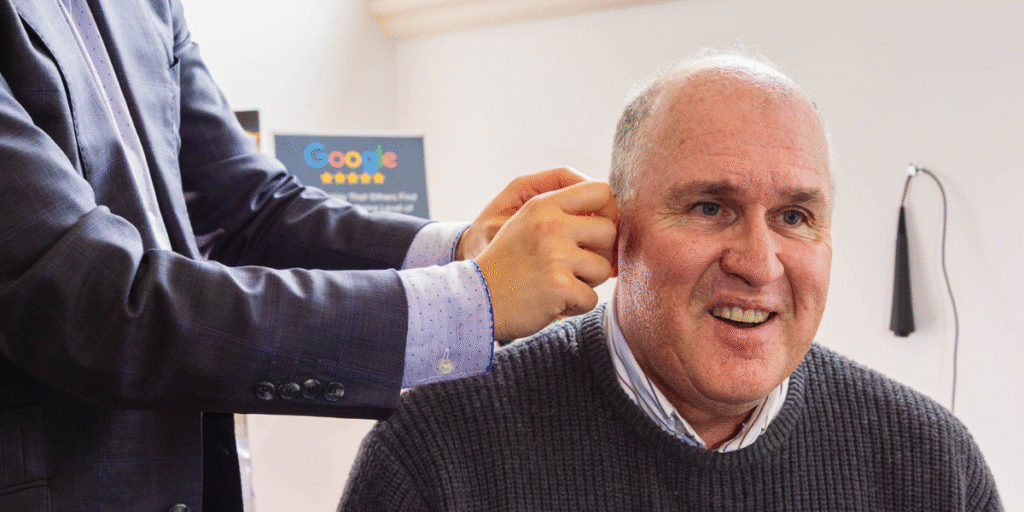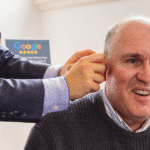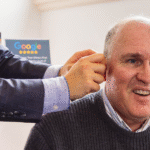7 Surprising Ways Hearing Loss Affects Dementia Risk
By NeuroHearing
February 18, 2025 – Updated 2:15 PM AEST
In a series of recent scientific discoveries, researchers have sounded an urgent alarm on a factor that could quietly double—or even quintuple—the risk of dementia: hearing loss. Experts from institutions like Johns Hopkins University and the National Institutes of Health warn that even mild hearing difficulties can have a domino effect on overall brain health, leading to cognitive decline and an increased risk of dementia (Lin et al., 2011).
This breaking development has far-reaching implications for public health. With the global population aging and dementia rates on the rise, scientists argue that addressing hearing loss may be one of the most effective strategies to protect brain health. Below, we break down seven surprising ways untreated hearing loss could be jeopardizing your cognitive well-being—and what you can do about it.
Quickly check your hearing with our online tool here: Online Hearing Check
1. Accelerated Brain Atrophy
One major revelation is that hearing loss can significantly speed up the rate at which the brain shrinks, a process known as atrophy. While mild brain shrinkage is common as we age, researchers have found that untreated hearing loss is linked to faster shrinkage in areas of the brain related to sound processing and memory (Livingston et al., 2020).
According to neuroimaging studies, when the auditory cortex receives fewer signals due to hearing impairment, it can atrophy more quickly. Over time, this can lead to reduced cognitive function and a higher susceptibility to dementia. By correcting hearing loss with hearing aids or other interventions, the brain may receive the stimuli it needs to maintain healthier structures for longer.
2. Increased Cognitive Load
Ever feel mentally exhausted after trying to follow a conversation in a noisy room? That’s no accident. When your ears struggle to pick up sound, your brain must work overtime to fill in the blanks. Instead of focusing on comprehension and memory, your mental resources are diverted into decoding muffled speech.
This phenomenon, often referred to as “cognitive load,” has been the subject of numerous studies. In one longitudinal study, older adults with hearing loss showed poorer performance on cognitive tests than their normal-hearing counterparts, suggesting that the extra mental effort required to hear can ultimately contribute to cognitive decline (Gurgel et al., 2014).
3. Social Isolation and Loneliness
Another underreported but critical issue is how hearing loss can lead to social withdrawal. Struggling to understand conversations in group settings can push individuals to avoid social gatherings, family events, and even phone calls. This sense of isolation not only affects emotional well-being but also takes a toll on brain health.
Social engagement is a key protective factor against dementia. A landmark study in the Lancet Commission on Dementia Prevention, Intervention, and Care reported that social isolation is one of the major modifiable risk factors for cognitive decline (Livingston et al., 2020). By addressing hearing loss early, individuals can stay connected, continue meaningful interactions, and potentially reduce their dementia risk.
4. Emotional Strain and Mental Health Issues
Hearing loss doesn’t just affect how well you hear—it can also influence your emotional well-being. Studies suggest that those with untreated hearing problems are more likely to experience depression, anxiety, and irritability (Cosh et al., 2016).
Poor mental health, in turn, can disrupt cognitive processes such as attention and memory. Depression has been associated with changes in brain structure that elevate dementia risk. Treating hearing loss may help alleviate these emotional stressors, offering a dual benefit: improved communication and a healthier emotional outlook that supports better overall brain function.
5. Delayed Diagnosis of Cognitive Decline
When a person’s hearing is compromised, it can mask early signs of dementia or other cognitive issues. For instance, difficulty understanding questions during a medical exam might be mistaken for memory lapses, leading to confusion about what exactly is happening. Conversely, an older adult who responds less or seems distracted might be wrongly presumed to have hearing trouble when they are actually experiencing the early stages of dementia.
Addressing hearing loss promptly can facilitate clearer medical evaluations. By separating hearing-related communication barriers from genuine cognitive symptoms, healthcare providers can detect possible signs of dementia earlier, enabling timely interventions and potentially better outcomes.
6. Strain on Relationships and Reduced Mental Stimulation
Healthy relationships often rely on clear communication. When hearing loss goes untreated, even routine conversations can become a source of frustration. This friction can reduce emotional closeness, leading to fewer shared activities and less intellectual stimulation.
Regular intellectual stimulation—such as discussing current events, playing board games, or engaging in community groups—has been linked to lower dementia risk. Unfortunately, individuals with hearing loss who avoid social interactions miss out on these cognitively enriching activities, further amplifying the risk of memory and thinking problems (Dewey & Dawson, 2006).
7. Compounding Other Health Risks
Hearing loss is often associated with other health conditions such as cardiovascular disease, diabetes, and even falls in older adults. Multiple studies have observed that individuals with both hearing loss and these coexisting conditions are at an even greater risk for cognitive decline (Lin et al., 2011).
When hearing impairment co-occurs with, for example, hypertension or diabetes, the overall “disease burden” on the body increases, placing additional stress on the brain. Early and effective management of hearing loss can reduce some of these compounding factors, potentially lowering the likelihood of future dementia-related issues.
Protecting Your Brain Health Starts with Your Ears
The research is clear: protecting your brain health means paying attention to your ears. From reducing social isolation to easing cognitive load, addressing hearing loss early can make a substantial difference in lowering your risk of dementia. Thankfully, modern hearing aids and assistive devices have advanced significantly, offering better sound quality and more discreet designs than ever before.
In a National Institutes of Health study, older adults at high risk for dementia who used hearing aids displayed nearly a 50% slower rate of cognitive decline over three years. This finding underscores the value of prompt action—not just for better hearing, but for a healthier brain in the long run.
Taking the Next Step
If you suspect that you or a loved one may be experiencing hearing loss, the sooner you seek help, the better. Early intervention can keep cognitive skills sharper and preserve a higher quality of life. At NeuroHearing, we offer customized assessments and modern treatment options that cater to both hearing and cognitive needs.
Ready to take action? Claim your FREE comprehensive hearing guide below (valued at $49) and receive practical tips for checking your own hearing. Plus, if you claim it now, you’ll be eligible for a 50% OFF promo code to use for any of our hearing services. (excluding custom ear buds).
Contact Us: Call 1300 638 763 or schedule an appointment here.
Quickly test your hearing online now: Online Hearing Check.
References
- Lin, F. R., et al. (2011). Hearing loss and incident dementia. JAMA Internal Medicine.
Link - Livingston, G., et al. (2020). Dementia prevention, intervention, and care: 2020 report of the Lancet Commission. The Lancet.
Link - Gurgel, R. K., et al. (2014). Relationship of hearing loss and dementia: a prospective, population-based study. Ear and Hearing.
Link - Cosh, S., et al. (2016). The relationship between hearing loss in older adults and depression and loneliness. Aging & Mental Health.
Link - Dewey, M. E. & Dawson, D. (2006). Cohort study of mini-mental test scores and educational level. Journal of Neurology, Neurosurgery & Psychiatry, 78(11).
Link - Deal, J. A., et al. (2023). Hearing aids slow cognitive decline in people at high risk. National Institutes of Health.
Link








